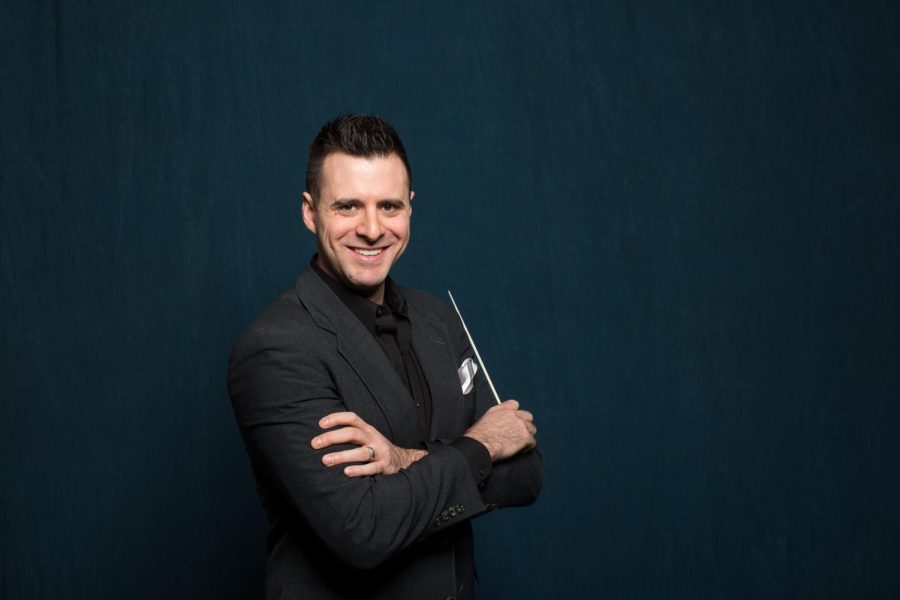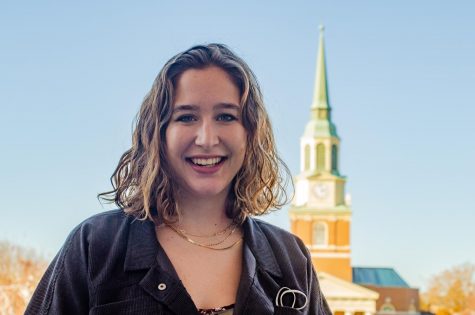Deacon Profile: Aaron Hardwick
Wake Forest’s new orchestra director has big plans
Courtesy of Suzette Niess Photography
Aaron Hardwick, Wake Forest’s new orchestra director, poses with his baton.
November 28, 2022
With a professional background in genres from bluegrass to musical theater and opera to video game music, Wake Forest’s newest Orchestra Director Aaron Hardwick seeks to enhance the program by highlighting the “human” side of music — for instance, the program’s first concert took place as part on an interdisciplinary series designed to engage the audience and “magnify underrepresented composers.”
“The idea of Pro Humanitate is very near and dear to my heart because as musicians, that is what we do: we serve the composer and their ideas, but we also serve each other and our audiences,” Hardwick said.
Music has been part of Hardwick’s life since childhood; in sixth grade, he began playing the viola through a program at his middle school and quickly “fell in love with orchestra music.” While he learned the classical styles on viola, he was also exposed to fiddle music by friends and family and picked up the style; it was during this time that he developed the ability to play music by ear and gained an appreciation for bluegrass pieces.
He continued to pursue music in higher education, earning a master’s degree in orchestral conducting from the University of South Carolina and a bachelor’s degree in music with honors from East Carolina University. Later, he graduated from Shenandoah Conservatory with a Doctor of Musical Arts in Performance (Conducting) and was hired as an adjunct professor at the institution.
Since 2015, Hardwick has been conducting professionally with companies such as the Brevard Philharmonic, Rochester Philharmonic, Williamsburg Symphony, and Aiken Symphony Orchestra with success both domestically and abroad. Among other honors, he was one of 50 educators in the nation to be honored with the prestigious Yale Distinguished Music Educator’s Award — he was selected from more than 300 applicants from fifty-seven countries to be named a finalist in the 2021 Erno Lányi International Conducting Competition.
In his professional career, Hardwick has also taken an interest in Lutomusicology – the study of video game music — an area that has been developing since the 1970s and 80s. His related research focuses on the performance side of the genre and highlights its history and legitimacy as an area of musical study.
“A lot of my research is about what that [performance of video game music] looks like and why
orchestras have decided to make that more popular…and then also to bring some light and some credence to it as an art form as opposed to putting it in this kind of populist dustbin that a lot of people do professionally,” Hardwick said.
He continued: “We’re definitely talking around generational lines because every single one of us understands how video games work…sometimes engaging that from the classical music side means you have to do a lot of explaining, but it is an incredible study.”
Although Hardwick explained that he cannot “divulge too much” about ongoing projects within the Music Department that would incorporate video game music, he notes that they will “absolutely be doing some things in that area.”
In spring 2023, Video Game Music will be offered as a “special topics,” course, and Hardwick hopes that it will become a permanent part of the curriculum in upcoming school years.
The first orchestra performance of the 2022-2023 school year, also the first performance Hardwick has led at Wake, took place on Oct. 21 as the finale of a three-part interdisciplinary installment designed to honor the life of composer Clara Schumann.
As Hardwick explains, Schumann was a German composer in the mid-1800s, who, despite her talent, is often overlooked. The series was conceived as a way to bring attention to her contributions to classical music and unique life, which was altered in her 20s when she undertook the responsibility of caring for her mentally ill husband.
The series began on Oct. 18 with a screening of a movie about Clara Schumann’s life. Later, there was a lecture on the same topic, and, to conclude, Dr. Lary Wang of the Department of Music performed one of Suchmann’s piano concertos alongside the Wake Forest Symphony Orchestra. All events were free and open to the public.
“We had incredible feedback from those in attendance who appreciated the interdisciplinary nature and “human” aspect of performance,” Hardwick said. “This, in my professional opinion, is what will help save concert hall performance..by doing this for the first concert, we set the bar high and with it an expectation that performance can be more than “just a concert,” but a shared, interdisciplinary, and very human way of experiencing art.”
The next orchestra performance is scheduled for Dec 1. Students will perform sections of the “Nutcracker” ballet alongside Mendelssohn’s “Reformation Symphony.” The festive, winter-themed concert will take place just a week before the end of the fall semester, and, as Hardwick explains, necessitates that members of the orchestra navigate a shorter rehearsal cycle to maintain the level of performance that the audience enjoyed during the October concert.
“The difficult part of performance is not riding waves of success, but thinking about the ebb and flow of the current moving forward as you look out into the future,” Hardwick said. “ This said, I know our students are up to the task because they are extremely talented and are passionate about music and performance.”














Guan • Nov 29, 2022 at 3:40 pm
Good job for publishing the interview slightly after the concert!
Chase • Nov 30, 2022 at 11:04 pm
thank u for ur thoughtful contribution to this publication guan